

Category:Human rights by issue. Quatorze besoins fondamentaux selon Virginia Henderson. Center for Cognitive Liberty & Ethics (CCLE) Maslow's hierarchy of needs. Maslow's hierarchy of needs, represented as a pyramid with the more basic needs at the bottom[1] Maslow's hierarchy of needs is a theory in psychology proposed by Abraham Maslow in his 1943 paper "A Theory of Human Motivation" in Psychological Review.[2] Maslow subsequently extended the idea to include his observations of humans' innate curiosity.
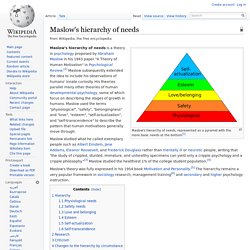
His theories parallel many other theories of human developmental psychology, some of which focus on describing the stages of growth in humans. Maslow used the terms "physiological", "safety", "belongingness" and "love", "esteem", "self-actualization", and "self-transcendence" to describe the pattern that human motivations generally move through. Maslow's theory was fully expressed in his 1954 book Motivation and Personality.[5] The hierarchy remains a very popular framework in sociology research, management training[6] and secondary and higher psychology instruction.
Pyramide ou roue de Maslow ? Voici une représentation de la pyramide des besoins de Maslow.
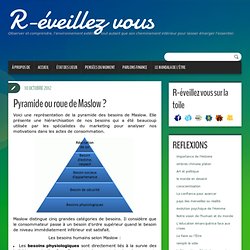
Elle présente une hiérarchisation de nos besoins qui a été beaucoup utilisée par les spécialistes du marketing pour analyser nos motivations dans les actes de consommation. Maslow distingue cinq grandes catégories de besoins. Il considère que le consommateur passe à un besoin d’ordre supérieur quand le besoin de niveau immédiatement inférieur est satisfait. Les besoins humains selon Maslow : Les besoins physiologiques sont directement liés à la survie des individus ou de l’espèce.
Le besoin de sécurité consiste à se protéger contre les différents dangers qui nous menacent. Right to equal protection. The Right to Equal Protection is a concept that was introduced into the Constitution of the United States during the American Civil War. It is intended to protect the rights provided by the United States Constitution for all individuals regardless of race, ethnicity, gender, etc. It is fundamentally based on the Fourteenth Amendment of the Constitution, intended to secure rights for former slaves.
The Constitution is claimed to uphold racial and gender equality, but until the 1950s, enforcing slavery, segregation, and gender inequality were major aspects of the history of the American federal government. Constitutional basis of equal rights[edit] In 1896, the United States Supreme Court determined that the "separate but equal" doctrine was constitutional in the case Plessy v. Right to protest. The right to protest is a perceived human right arising out of a number of recognized human rights. While no human rights instrument or national constitution grants the absolute right to protest, such a right to protest may be a manifestation of the right to freedom of assembly, the right to freedom of association, and the right to freedom of speech.[1] Many international treaties contain clear enunciations of these rights.
Such agreements include the 1950 European Convention on Human Rights, especially Articles 9 to 11; and the 1966 International Covenant on Civil and Political Rights, especially Articles 18 to 22. Right to education. The right to education is a universal entitlement to education, recognized in the International Covenant on Economic, Social and Cultural Rights as a human right that includes the right to free, compulsory primary education for all, an obligation to develop secondary education accessible to all, in particular by the progressive introduction of free secondary education, as well as an obligation to develop equitable access to higher education, ideally by the progressive introduction of free higher education.
The right to education also includes a responsibility to provide basic education for individuals who have not completed primary education. Humanrights.
Peace First... Travailleur pauvre. Un article de Wikipédia, l'encyclopédie libre.
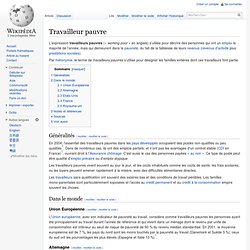
L'expression travailleurs pauvres (« working poor » en anglais) s'utilise pour décrire des personnes qui ont un emploi la majorité de l’année, mais qui demeurent dans la pauvreté, du fait de la faiblesse de leurs revenus (revenus d'activité plus prestations sociales). Par métonymie, le terme de travailleurs pauvres s’utilise pour désigner les familles entières dont ces travailleurs font partie. Généralités[modifier | modifier le code] En 2004, l'essentiel des travailleurs pauvres dans les pays développés occupaient des postes non-qualifiés ou peu qualifiés[1].
Work ethic. Workers exhibiting a good work ethic in theory should be selected for better positions, more responsibility and ultimately promotion.

Workers who fail to exhibit a good work ethic may be regarded as failing to provide fair value for the wage the employer is paying them and should not be promoted or placed in positions of greater responsibility. Support[edit] Steven Malanga refers to "what was once understood as the work ethic—not just hard work but also a set of accompanying virtues, whose crucial role in the development and sustaining of free markets too few now recall.[1] Max Weber quotes the ethical writings of Benjamin Franklin: Remember, that time is money. Weber notes that this is not a philosophy of mere greed, but a statement laden with moral language. Many conservatives believe that laziness is morally wrong, even reprehensible, because one is not doing their share of the work and living off of the hard work of others, and for this reason oppose welfare programs.
Criticism[edit] Decent work. Decent work is the availability of employment in conditions of freedom, equity, human security and dignity.
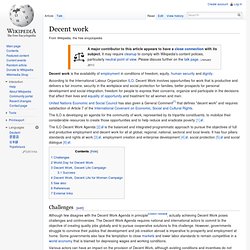
According to the International Labour Organization ILO, Decent Work involves opportunities for work that is productive and delivers a fair income, security in the workplace and social protection for families, better prospects for personal development and social integration, freedom for people to express their concerns, organize and participate in the decisions that affect their lives and equality of opportunity and treatment for all women and men. United Nations Economic and Social Council has also given a General Comment[1] that defines "decent work" and requires satisfaction of Article 7 of the International Covenant on Economic, Social and Cultural Rights. Qualité de vie. Un article de Wikipédia, l'encyclopédie libre. La qualité de vie d’une population est un enjeu majeur en sciences économiques et en science politique. On utilise les notions proches d’utilité et de bien-être. Living wage. In public policy, a living wage is the minimum income necessary for a worker to meet their needs that are considered to be basic.
This is not necessarily the same as subsistence, which refers to a biological minimum, though the two terms are commonly confused. These needs include shelter (housing) and other incidentals such as clothing and nutrition. Poverty saps mental capacity to deal with complex tasks, say scientists. Poor people spend so much mental energy on the immediate problems of paying bills and cutting costs that they are left with less capacity to deal with other complex but important tasks, including education, training or managing their time, suggests research published on Thursday.
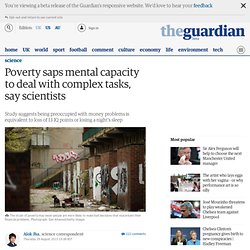
The cognitive deficit of being preoccupied with money problems was equivalent to a loss of 13 IQ points, losing an entire night's sleep or being a chronic alcoholic, according to the study. The authors say this could explain why poorer people are more likely to make mistakes or bad decisions that exacerbate their financial difficulties. Anandi Mani, a research fellow at the Centre for Competitive Advantage in the Global Economy at the University of Warwick, one of the four authors of the study, said the findings also suggest how small interventions or "nudges" at appropriate moments to help poor people access services and resources could help them break out of the poverty trap. Niveau de vie. Un article de Wikipédia, l'encyclopédie libre.
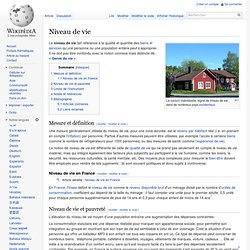
Le niveau de vie fait référence à la qualité et quantité des biens et services qu’une personne ou une population entière peut s’approprier. La Via Campesina : International Peasant Movement. Right to an adequate standard of living. The right to an adequate standard of living is recognized as a human right in international human rights instruments and is understood to establish a minimum entitlement to food, clothing and housing at a subsistence level. The right to food and the right to housing have been further defined in human rights instruments. The right to an adequate standard of living is enshrined in Article 25 of the Universal Declaration of Human Rights (UDHR) and Article 11 of the International Covenant on Economic, Social and Cultural Rights.[1] The most significant inspiration for the inclusion of the right to an adequate standard of living in the UDHR was the Four Freedoms speech by US President Franklin Roosevelt, which declared amongst others the freedom from want.
Poverty reduction. Graph of global population living on under 1, 1.25 and 2 equivalent of 2005 US dollars a day (red) and as a proportion of world population (blue) from 1981 to 2008 based on data from The World Bank Poverty is the state of human beings who are poor.
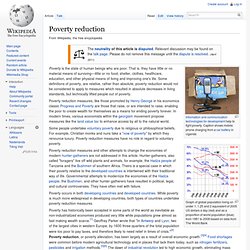
That is, they have little or no material means of surviving—little or no food, shelter, clothes, healthcare, education, and other physical means of living and improving one's life. Some definitions of poverty, are relative, rather than absolute, poverty reduction would not be considered to apply to measures which resulted in absolute decreases in living standards, but technically lifted people out of poverty. Poverty reduction measures, like those promoted by Henry George in his economics classic Progress and Poverty are those that raise, or are intended to raise, enabling the poor to create wealth for themselves as a means for ending poverty forever. The quest to end poverty.
Quality of life. Quality of life (QOL) is the general well-being of individuals and societies.
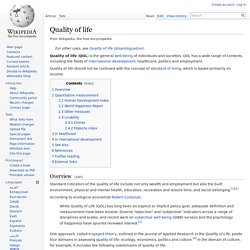
Non-GMO Project. Choice theory. Choice theory may refer to: rational choice theory, the mainstream choice theory in economics; it's the "heart" of microeconomics non-standard theories are in their infancy and mostly the subject of behavioral economicssocial choice theory, a conglomerate of models and results concerning the aggregation of individual choices into collective choicesGlasser's choice theory, a psychological theory used in some brands of counseling.
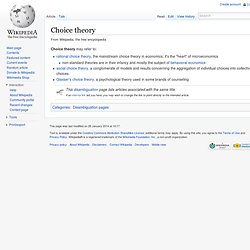
Choice Theory Psychology, Reality Therapy, Lead Management, & Quality Schools. Choice Theory.
Food Voices: Stories of the Food Sovereignty Movement From Around the World. Right to water. The right to water to satisfy basic human needs for personal and domestic uses has been protected under international human rights law. When incorporated in national legal frameworks, this right is articulated to other water rights within the broader body of water law. The human right to water has been recognized in international law through a wide range of international documents, including international human rights treaties, declarations and other standards. The main international treaties explicitly recognizing the human right to water include the 1979 Convention on the Elimination of All Forms of Discrimination Against Women (CEDAW, Art.14(2)), the 1989 Convention on the Rights of the Child (CRC, Art.24). Beyond other treaties implicitly recognize the right, for instance the International Covenant on Economic Social and Cultural Rights.
The most clear definition of the Human right to water has been issued by the UN Committee on Economic, Social and Cultural Rights. See also[edit] Right to food. Right to food around the world (as of 2011-2012).[1][2][3] Adopted or drafting a framework law (19). Constitutional, explicit as a right (23). Constitutional, implicit in broader rights or as directive principle (41). Droit à l'eau. Un article de Wikipédia, l'encyclopédie libre. Femme collectant de l'eau dans un trou creusé dans un lit d'une rivière à sec, près du village de Kataboi (Kenya). Le droit à l'eau est considéré par de nombreux auteurs et personnalités comme un droit de l'homme important ou essentiel, fondé sur le droit international, comme « un droit de l’Homme et des générations futures en émergence »[1] et comme une condition nécessaire pour l'atteinte des objectifs de l'ONU en terme de santé publique, de bonne gouvernance de développement durable et de paix dans le monde.
Une grande partie des ressources en eau ne connaît pas les frontière, et peut être polluée, gaspillée ou surexploitée par un voisin indélicat ou plus riche et mieux équipé en moyens de pompage. BasicNeeds – Building a better world with mentally ill people. "basic needs" Basic needs. The basic needs approach has been described as consumption-oriented, giving the impression "that poverty elimination is all too easy. "[4] Amartya Sen focused on 'capabilities' rather than consumption. In the development discourse, the basic needs model focuses on the measurement of what is believed to be an eradicable level of poverty.
Development programs following the basic needs approach do not invest in economically productive activities that will help a society carry its own weight in the future, rather it focuses on allowing the society to consume just enough to rise above the poverty line and meet its basic needs. Basic Needs Approach, Appropriate Technology, and Institutionalism by Mohammad Farooq.